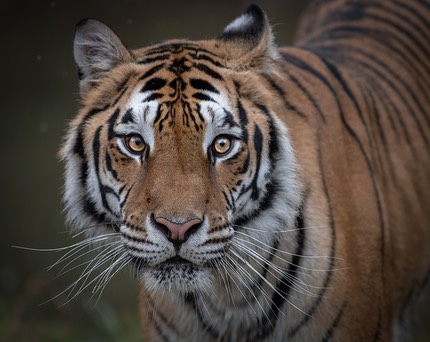I recently had someone believe that they were blasting me to smithereens on the Internet by comparing my photography to someone who's regarded as one of the top ten photographers of all time. While they thought they were dissing me big time, I actually was quite amused to find someone trying to compare me to the very best.
For what it's worth, I've never aspired to that ("be the best"). I don't enter contests and I don't accept awards. That's because I'm not interested in subjective external ranking of my photographic work, I'm only interested in my work as I see fit to produce it. I rarely show it to others, as I've kind of been saving that for my retirement years to do. This drives my teaching assistant crazy, as he's pretty sure he's not seen what I believe to be my best work even for sessions where's he been shooting with me (he's right ;~). Even my mom complains about not seeing my best work.
Sorry, I shoot for myself, not others. Maybe by the time I'm dead I'll get discovered by others ;~).

Another of those photographs that just aren't my best. I'm pretty sure Hershey—the name of the cat in the photo—knows this, which is why she's staring at me wondering what I'm doing...either that or she wanted a closer look at that Z7 I was using, because she'd never seen one before. Hard to say. Probably wondering what I'm doing, though, as I had a US$600 lens on the camera and that just couldn't be right, could it?
Now all this came up in the context of evaluating equipment. The supposed connection was that you have to be an exceptional—remember, top ten all time—photographer in order to correctly evaluate camera gear.
You might notice that the corollary sounds completely false: you need to be an exceptional evaluator of camera gear to be an outstanding photographer.
Indeed, it is false. I know many excellent pro photographers that aren't at all that sure of anything about their gear. They have a Photoshop expert on staff to sort out the pixels, they have assistants to prepare gear for shooting, and they really don't care what's handed them as long as it is set right for the conditions and takes reasonable photos. (No, I'm not going to name these folk, but there are some names on the list I'm pretty sure you'd recognize.)
Since somewhere about five years into the DSLR era I started writing something similar to the following: "if you can't get excellent prints at maximum size of a desktop inkjet printer with your DSLR, it isn't the camera that's the problem." That certainly applies to pretty much any interchangeable lens camera you can buy today.
That isn't to say that Camera X isn't better than Camera Y for a specific purpose. You can't beat a Nikon D5 for shooting sports in low light, for example. But that also doesn't mean you can't take excellent sports shots in low light with something else. You also can't beat a Nikon D850, Z7, or Sony A7Rm3 at base ISO for shooting landscapes short of using a medium format camera, and even that's only a close win. But that doesn't mean you can't take excellent landscape shots with something else.
My friend Mike Johnston at The Online Photographer recently noted that car magazines these days are all track-testing cars instead of road-testing them. We all buy cars as basic transportation, not as racing candidates, so essentially the level of detail that the car magazines are going into on esoteric and non-likely performance needs of the purchaser is remarkable.
Thing is, this tends to happen with all special interests: the media goes higher and higher upscale until it reaches a point where it's talking to the few, not the many. That's because the many make a purchasing decision only every few years or so. They don't need to keep up with whether the most recently announced camera has 0.1 stops more dynamic range or not. No one's really helping them do better with what they have and will continue using for a few years—there's no ad money in that—so eventually this also leads to lower reader participation overall.
That's one reason why I wrote about ecosystems recently. If you have a thriving ecosystem, there actually may be something that the every-once-in-awhile camera purchaser is still interested in today. Historically, that's been lenses, and it's one of the reasons why I try to keep up with as many of the lens releases with thorough reviews as possible. It's also the reason why I keep falling behind: there has to be a dozen lenses sitting in my offices right now I haven't gotten around to a final report on, and new lenses keep proliferating like weeds in Spring.
But getting back to my point: a great lens doesn't automatically generate great photos. Someone who recognizes a great lens from a mediocre one doesn't necessarily know how to take great photos, either. We do expect, however, that it might be easier to create a great photo with a great lens than it is with a mediocre lens, and that has some ring of truth to it. A great lens has fewer flaws you might have to consider when taking a picture or doing post processing of it later.
So I continue on with my Web sites as I have always: trying to make sense of ever-changing landscape of photography gear, while every now and then dropping technique or how-to articles for what you've got.
Now if you'll excuse me, there's another photo trade show I need to run off to attend so I can get all worked up about the latest gear.